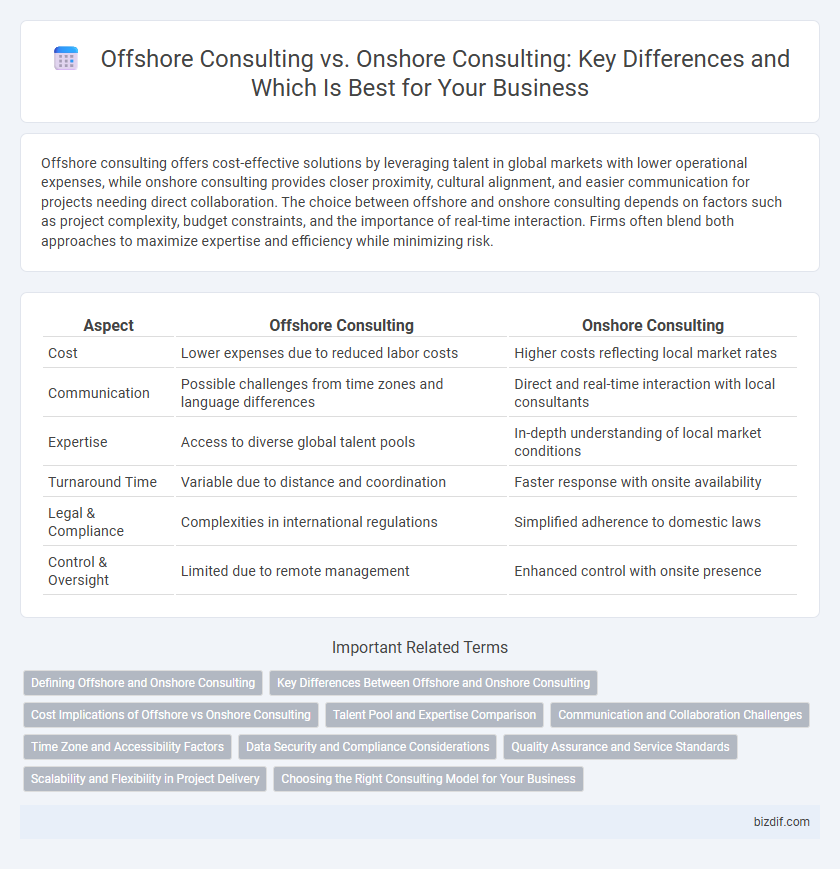Offshore consulting offers cost-effective solutions by leveraging talent in global markets with lower operational expenses, while onshore consulting provides closer proximity, cultural alignment, and easier communication for projects needing direct collaboration. The choice between offshore and onshore consulting depends on factors such as project complexity, budget constraints, and the importance of real-time interaction. Firms often blend both approaches to maximize expertise and efficiency while minimizing risk.
Table of Comparison
| Aspect | Offshore Consulting | Onshore Consulting |
|---|---|---|
| Cost | Lower expenses due to reduced labor costs | Higher costs reflecting local market rates |
| Communication | Possible challenges from time zones and language differences | Direct and real-time interaction with local consultants |
| Expertise | Access to diverse global talent pools | In-depth understanding of local market conditions |
| Turnaround Time | Variable due to distance and coordination | Faster response with onsite availability |
| Legal & Compliance | Complexities in international regulations | Simplified adherence to domestic laws |
| Control & Oversight | Limited due to remote management | Enhanced control with onsite presence |
Defining Offshore and Onshore Consulting
Offshore consulting refers to hiring external experts located in different countries, often to leverage cost advantages and specialized skills, while onshore consulting involves partnering with consultants based within the same country as the client, offering ease of communication and cultural alignment. Offshore consulting typically emphasizes remote collaboration and scalability, whereas onshore consulting prioritizes proximity and direct interaction. Both models serve distinct business needs depending on factors like budget, project complexity, and regulatory requirements.
Key Differences Between Offshore and Onshore Consulting
Offshore consulting primarily involves hiring experts located in different countries, often leveraging cost advantages and access to specialized skills unavailable locally. Onshore consulting focuses on consultants within the client's country, ensuring easier communication, cultural alignment, and faster response times. Key differences include cost efficiency, time zone coordination, language barriers, and the level of direct interaction with clients.
Cost Implications of Offshore vs Onshore Consulting
Offshore consulting typically offers significant cost savings due to lower labor rates and reduced operational expenses in countries like India and the Philippines. Onshore consulting, while often more expensive, provides advantages in communication, cultural alignment, and faster turnaround times for businesses in the same country. Companies must weigh the lower costs of offshore consulting against potential challenges in coordination and project management when deciding between the two.
Talent Pool and Expertise Comparison
Offshore consulting offers access to a broad, cost-effective talent pool with specialized technical expertise often found in emerging markets, enabling scalable project execution. Onshore consulting provides consultants with deep local market knowledge and direct cultural alignment, which is critical for projects requiring nuanced client interaction and regulatory compliance. Evaluating the balance between offshore cost advantages and onshore specialized expertise is essential for selecting the optimal consulting strategy.
Communication and Collaboration Challenges
Offshore consulting often faces challenges in communication due to time zone differences, language barriers, and limited real-time interactions, which can delay project updates and impact collaboration effectiveness. Onshore consulting typically benefits from easier access to consultants, enabling seamless communication and more frequent face-to-face meetings that enhance teamwork and faster issue resolution. Effective collaboration requires tailored strategies for each model, such as using advanced communication tools and scheduling flexibility to overcome offshore barriers.
Time Zone and Accessibility Factors
Offshore consulting often involves working across multiple time zones, which can lead to delays in communication and extended project timelines, whereas onshore consulting aligns with the client's local time zone, enhancing real-time collaboration and faster decision-making. Accessibility is generally higher with onshore consultants due to geographic proximity, enabling face-to-face meetings and immediate support. Offshore consulting may reduce costs but requires robust communication tools to overcome time zone barriers and accessibility challenges.
Data Security and Compliance Considerations
Offshore consulting often raises concerns regarding data security due to varying international regulations and potential exposure to cyber threats, requiring stringent compliance measures aligned with global standards such as GDPR or HIPAA. Onshore consulting provides greater control over data protection policies and easier alignment with local regulatory frameworks, minimizing risks associated with data breaches or legal non-compliance. Organizations must evaluate the trade-offs between cost savings and robust data security protocols when choosing between offshore and onshore consulting services.
Quality Assurance and Service Standards
Offshore consulting offers cost-effective solutions but may face challenges in maintaining consistent quality assurance and service standards due to cultural and time zone differences. Onshore consulting ensures higher quality control and adherence to service standards through closer collaboration and real-time communication with clients. Choosing the right consulting model depends on the project's complexity and the criticality of maintaining stringent quality assurance protocols.
Scalability and Flexibility in Project Delivery
Offshore consulting offers significant scalability, enabling businesses to quickly expand resources without geographical limitations, which supports large-scale project delivery demands. Onshore consulting provides greater flexibility through closer collaboration, real-time communication, and cultural alignment, ensuring adaptations to project scope and timelines are efficiently managed. Companies often balance offshore scalability with onshore flexibility to optimize cost efficiency and agile project execution.
Choosing the Right Consulting Model for Your Business
Selecting between offshore consulting and onshore consulting depends on factors such as budget constraints, project complexity, and communication needs. Offshore consulting offers cost-effective solutions and access to global expertise, making it ideal for businesses seeking to optimize expenses without compromising quality. Onshore consulting ensures closer collaboration, cultural alignment, and faster response times, benefiting projects requiring high levels of coordination and local market knowledge.
Offshore Consulting vs Onshore Consulting Infographic

 bizdif.com
bizdif.com